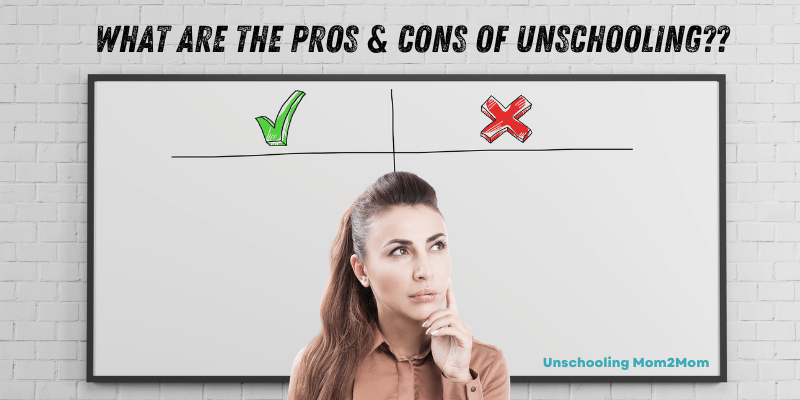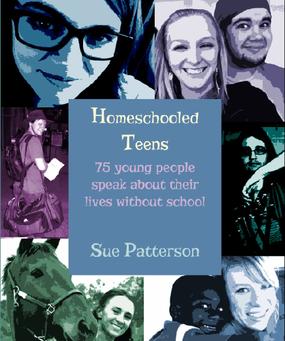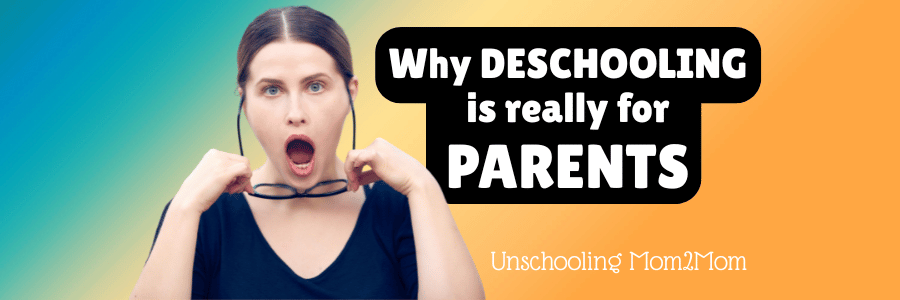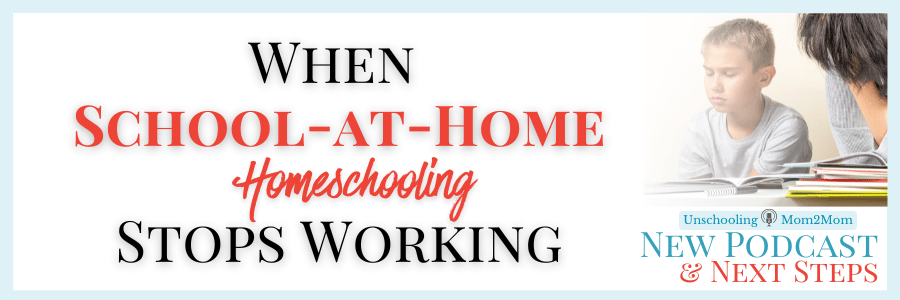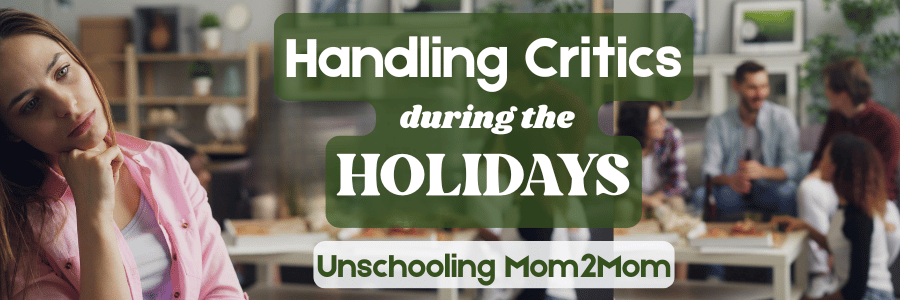The Pros and Cons of Unschooling
Podcast Transcript
Lots of people sit on the fence, trying to weigh it all out - making their lists for or against unschooling. Over in the Unschooling Mom2Mom facebook group, people post questions wanting to hear what everyone thinks. In the past, I’ve been pretty sure that society does a good enough job saying what they think is wrong with unschooling - but only unschoolers can tell you what’s great about it.
Then I realized, that most people are way off the mark on the REAL pitfalls of unschooling. And, yeah, there are some.
Maybe we should talk about it.
I’m Sue Patterson, longtime unschooling mom with 3 now grown unschooled kids. I pop onto this podcast each week to give you a little pep talk - just 5-10 minutes of reassurance to help you start your week and keep you encouraged. Because one thing I know, after 30 years of this - unschooling works. It just does. And maybe these little podcasts can be just the lifeline you need!
And… if you need a little more, I’d love to have you join us in my Creating Confidence membership group. We meet on zoom calls, in a private Facebook group, and WhatsApp channel - brainstorming and sharing solutions to everyday issues that come up. One of the keys to unschooling success is about finding the support that works for you. That’s why I created the coaching group - you should join us!
OK, on to the Pros and the Cons of Unschooling.
Since I obviously think there are more Pros than cons - because this the choice MY family made, let’s start with the downside.
It’s not the things you’re probably thinking of…
because Unschooled Kids ARE
- prepared for adulthood,
- get into college,
- make friends,
- learn to manage in the real world.
Let's Start with the "Cons" - Reasons you might not want to unschool
There are some issues that might make you pause or trip you up:
There’s no formula.
When we say individualized, we mean it. You can’t copy off of someone else’s paper, read the secret recipe in some book. You have to look at your own child standing in front of you and figure out what needs to happen next. For some people, that’s really freeing. For others, it can be terrifying. Usually because they/you? Were taught that you’re not capable on your own. Unschooling moms and dads have to overcome some personal doubts and second-guessing to get to this place where they can unschool with some relative degree of confidence.
Box Checkers Struggle.
You never “arrive.” You never “finish.” You don’t have boxes to check and call it “done.” You always have little worries here and there. Partly it’s because you’re a good parent. Partly it’s because how do we ever know for sure about other people and what they need from us? That’s why building trust, learning to communicate clearly makes all the difference. For some people, this is pretty hard.
People Pleaser Issues.
People Pleasers” sometimes have a lot to work through. Again, it’s about that trust and confidence. John Holt, a pioneer in the research of homeschooling and unschooling said that we have a hard time trusting children because we were convinced ourselves, that we could not be trusted. And that’s not true at all.
You're IT!
Another problem with unschooling is you have no one else to blame if things don’t go as you envisioned. The buck stops here, so to speak. Or as my kids used to say, “Tag, you’re It!”
Some Don't Want to Embrace the Internal Work.
All of these negatives boil down the fact that the parent has to be willing to do a significant amount of internal work. Sometimes that can look like deschooling - undoing all the pieces we carry with us from our own school experiences, examining them to see what’s true, and what are misconceptions that we have or that we were convinced were true but arent. And sometimes our internal work has to do with parenting or our ideas about how the adults and the children are supposed to interact. Maybe we didn’t have a great childhood - or maybe it was ok, but lots of the expectations and ideas that we bring into adulthood aren’t what we want to duplicate now that we’re looking at it all with intention and maybe even a little more clarity. This is some serious unpacking that unschooling parents have to do, usually.
So those are five things that - at least on the surface - look like negatives... reasons to hesitate on making the decision to unschool.
It’s interesting, in the end, when you push through these and DO the work that needs to happen, it makes life SOO much better! So they’re only negatives as you’re facing what needs to be done. And, of course, your own fears or emotional baggage will try to divert you from this task of unschooling. Yes, it can be hard to climb over these obstacles - but if I can do it, so can you!
When you think about your own reasons why. When you look at that child standing in front of you who needs you to push past your fears and look at this option for THEM. It might be the catalyst you need.
Ready for the Pros? The Reasons Unschooling is a GREAT Idea?
Since this is a weekly PEP TALK about unschooling - let me tell you the PROS I see for offsetting all the CONS. And I would LOVE it if you added more below in the comments! Initially I was going to do a DOZEN… but I ended up with a couple more than that!
Unschooled kids get to have a truly individualized education. They can learn at the pace that fits them - and not because a class of same-aged kids all have to moved from Point A to Point B.
Unschooled kids can take their time. Much has been written about hurrying kids through childhood, from one activity to another, class to class. This slower pace allows kids to absorb information without the stress and pressure of rushing. It allows them to create a habit of being more thoughtful and taking their time to make decisions.
Unschooled kids can get to know themselves better and develop more self-confidence. They’re not trying to please others - teachers, parents, peers. This allows them to be aware of their own preferences and not have to wait until middle age to figure “who they are” or “what they themselves like.”
Unschooled kids get to learn that failures aren't devastating. They don’t have to be humiliating experiences to be avoided at all costs. Instead, they can see these disappointments as data to help them modify their decisions for next time.
Unschooled kids have a fun childhood They get to follow curiosities, explore, discover and have fun - and learning takes place!
Unschooled kids live with more freedom. They get to learn how to navigate their way through having freedom and being able to make choices. You can’t really learn to make choices if someone is always making them for you. So even when the decision doesn’t work out, it’s all part of a learning process that unschooled kids have time to work through.
Unschooled kids develop research skills. They learn how to find resources and explore their interests more deeply. This skill is SOO much more important than memorizing rote facts that can be easily looked up on their phone.
Unschooled kids feel unconditionally loved. They get to know that their parents are prioritizing the relationship with them. How they do in school or whether they excel aren’t factors in whether or not they have their parents’ approval. Of course, everyone/most people love their kids. But unschooled kids have the opportunity to feel truly unconditional love from their parents.
Unschooled kids can be well rested.
Much has been written about the sleep deprivation kids have to work through - especially teens. Not unschooled kids. They can sleep until they are ready to wake up.
Want to hear from the kids themselves?
In my book, Homeschooled Teens, 75 young people spoke about their lives without school. I asked them all the questions parents want to know, like...
"How did you make friends?"
"Did you get into college?"
"What was your life like?"
"Do you still like your mom?"
These were the advantages they saw in this unconventional approach to their teen years.
They’re not convinced that learning is drudgery. They haven’t had boring information shoved down their throats year after year.
They’ve been exposed to real world opportunities. They’re out in it all the time! They didn’t have to wait until they were 18.
They’ve been able to avoid unnecessary stress. Bullying, peer pressure, unnecessary competition that’s all so commonplace in a school day.
Their socialization opportunities are better. It’s based on shared experiences and interests. It doesn’t matter if someone is the same age/grade level. Do they like the same things? - that’s the basis for friendship.)
They have better influences, primarily because of this focus on connection within the family. When a parent learns how to partner with their child, trust develops between both. It’s much easier to share problems or seek help, if you know your parent is going to be there to help you without judgements and “I told you so’s.”
There you have it!
A few Pros and Cons for Unschooling. I hope it helps you make your decision - or reinforces the decision you’ve already made.
OK! Join me in my membership group, where I can offer you a LOT of support!
Otherwise, I’ll be back with you again next week. Enjoy the adventure!
EDITED to ADD:
When I first shared this podcast in the Unschooling Mom2Mom Facebook group, one of the moms asked,
"I see that there are plenty of "Pros" for the children, but what about "Pros" for the parents?"
That was an excellent point! I'm so focused on helping parents see that they aren't "ruining" their children by unschooling, I neglected to share the very real benefits that parents have. Here are a few.
10 Additional Pros for Unschooling - for the Parents!
More time. Tuning into your kids throughout the day allows you to have more opportunities to understand what's going on with your child and how you can help them - as opposed to only having time with them when they're worn out after a long day at school.
More adventures. Shared experiences help parents connect more, as well as enjoy exploring the world with the people you love the most!
Flexible Schedules. Unschooling allows you to meet the needs of the people in your family - as opposed to having to prioritize the needs of the school system. Having the freedom to control your own calendar can enable you to move around during non-peak time for better rates and less crowds.
Better Information about the kids. Instead of having to squeeze all of our interaction time into weekends and an hour or two after school, parents have access to their kids all day. This allows us to see if they're "morning people" or "night owls" and plan accordingly.
Noticing more about their childhood. Instead of having to squeeze all of our interaction time into weekends and an hour or two after school, parents who unschool are about to witness their children's childhood unfold before our eyes. This allows us to participate more and be an active part of their lives.
Slower Pace. It's such a perk to not have to rush around madly at the crack of dawn to get a sleepy kid off onto the bus or to school on time. Rushing around tends to make us bark orders and interferes in our ability to connect with the child. This slower pace allows us to help the kids see what's needed to get where they want to go - without all the hurried stress!
Learning about cool things. Whether we missed it in school ourselves, or we stumble upon interesting facts about the world, parents have the chance to learn more too!
Becoming the Parent we want to be. Whether it's the pace or the unschooling philosophy itself, parents are able to get off the one-size-fits-all conveyor belt, and make parenting choices that work for their family. Unschooling encourages us to look at our own motivations and why we do what we do - or if that's even necessary.
Learning more about ourselves. As we learn more about unschooling, we can't help but notice our own preferences and interests. Many unschooling parents discover new hobbies to explore and model this for the children.
Stopping negative generational patterns. Sometimes we have had experiences in our own childhoods that were traumatic. Healing our own childhood wounds can happen in this kind of environment and allows us to stop negative cycles from being passed down from one generation to the next.
Adding all of these together allows unschooling parents to have more connection with their kids.



